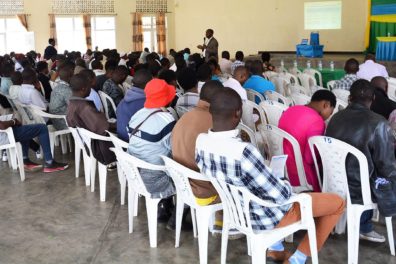Tax and Governance
There is mounting evidence that increased taxation can spur statebuilding and increase government accountability. This possibility is critical: without strong links between taxation, statebuilding and accountability, expanded taxation may fail to deliver improved outcomes for taxpayers. However, such links are far from guaranteed, and depend, among other things, on the types of taxes raised, the nature and equity of tax enforcement, the extent of transparency, the existence of forums for popular engagement and the role of civil society in supporting popular demand making. The current phase of our research on this theme focuses on identifying concrete strategies for strengthening the links between taxation and good governance at both the local and national levels.
Publications:
The pandemic is in many ways a crisis of governance. Its magnitude and mitigation are determined by the nature of policy responses and crisis management by leaders and governments, and existing socioeconomic inequality has led to a disproportionate impact on some groups. The pandemic has created a set of unique challenges that underscore the need…
An important part of every country’s development process is the building of a social contract in which citizens pay tax and, in turn, receive public goods and services. Evidence suggests that this is associated with the establishment of a norm of tax payment and a belief that non-payment is wrong. We exploit a new, nationally…
In this chapter, Moore and Prichard provide two different kinds of answers to the question of how governments of developing countries can increase tax revenues. First, they discuss seven potential revenue sources that governments of developing countries tend to use less than they should. Mining, tobacco and alcohol, the incomes and wealth of rich people,…
The extractive sector is of primary importance to African states. Of the 54 countries on the continent, 20 are considered by the International Monetary Fund (IMF) to be rich in natural resources. These are countries whose natural resources account for more than 25 per cent of total exports. All are sub-Saharan African countries: seven export…
Fuel subsidies in Nigeria are enormous. At last estimate, the state subsidises gasoline to the tune of USD 3.9 billion — almost double the entire health budget. Subsidies exist because the government fixes the price of gasoline for consumers below the international price and uses government resources to pay for the difference. They were first…
Fuel subsidies in Nigeria are enormous. At last estimate, the state subsidises petrol to the tune of US$3.9 billion – almost double the entire health budget. Such subsidies come at great cost: the opportunity costs of such spending on other development objectives are large; the distribution of resources to the state governments is reduced; the…
A demand-supply framework has been developed and applied to Tanzania to explore the link between democratisation, economic liberalisation and the use of tax exemptions to fund political parties’ electoral campaigns. In Tanzania, the demand for this type of money has increased since one-party rule was abolished in 1992. This led to reduced state subsidies to…
Tax expenditures occur when a government provides a reduction in a tax obligation such that it collects less tax than it would have otherwise collected. Tax expenditures are an integral, though controversial, part of all contemporary tax systems. This policy briefing first summarises the various ways in which tax expenditures can be defined and measured….
While there is much speculation about Nigeria’s probably post-oil future, it is in fact already a present reality: In 2015, for the first time since 1971, Nigeria’s public finances had already earned more from non-oil sources than from oil revenues. The transformation to a post-oil future is already in the past.
A demand-supply framework has been developed and applied to Tanzania to explore the link between democratisation, economic liberalisation and the use of tax exemptions to fund political parties’ electoral campaigns. In Tanzania, the demand for this type of money has increased since one-party rule was abolished in 1992. This led to reduced state subsidies to…
Blogs:
Despite being recognised as a critical aspect of tax compliance, taxpayer knowledge is a very under-explored topic. Using evidence from Rwanda and Eswatini, Giulia Mascagni explores why taxpayer education matters, whether it is effective, and how research can inform governments’ taxpayer education programmes. Across Africa, many taxpayers have a shockingly poor understanding of the tax…
Amid the Covid-19 pandemic, changes that might ordinarily take a few years are now occurring in the span of just a few months. The uptake of e-commerce and the adoption of video-conferencing, for example, have increased rapidly. This distinctive feature of crises—that they can accelerate otherwise slow-moving trends—can be harnessed by those seeking to create…
One of the strongest arguments for investing in the tax capacity of developing countries is the supposed participation dividend of taxation. Beyond providing more tax revenue with which the government can supply essential public services, tax collection is thought to stimulate citizen engagement in the government, and ultimately, political accountability. The accumulated evidence of a…
Research Projects:
Since having been declared a global pandemic in March 2020, Covid-19 has altered the daily life of the vast majority of the world population, with major impacts on its health and livelihood. While Sub-Saharan Africa (SSA) was not amongst the first regions to be hit, cases have been reported in all of its countries since…
This inquiry aims to examine the effect of intergovernmental fiscal transfers on fiscal behaviours of local governments in Ethiopia for the period 1992–2018. The empirical analysis shall follow the systems general methods of moments regression technique. The motivation for using this estimation technique is to provide special focus to the issue of endogeneity by estimating…
Taxation is thought to stimulate participation and accountable governance. This project examines how tax collection affects local bureaucrat performance in the DRC. We exploit random variation in whether local bureaucrats known as avenue chiefs were responsible for property tax collection (treatment), or whether agents of the tax ministry collected taxes within chief jurisdictions instead (control)….
The Ferdi will update the legal and tax database country by country. It estimates that the average time needed to update a country is four days. However, it goes without saying that countries that have made major tax reforms will require more time than countries whose laws have not changed. For example, Burkina Faso, which…
This project will explore the scope and size of energy-related tax expenditures in Africa. Tax expenditures (including rate reductions, exemptions and other forms of foregone revenue) can significantly reduce the overall revenue received by African governments. The literature on energy subsidies suggests that energy-related tax expenditures are often among the largest forms of revenue loss….
Project Outputs
Policy Brief
The recent crash in oil prices and subsequent economic crisis has highlighted the grave consequences that are associated with Nigeria’s heavy dependence on oil revenue and its low tax base. While this pattern is well known for the country, there is limited evidence on the state-by-state variation in oil dependence and economic outcomes. This study…



